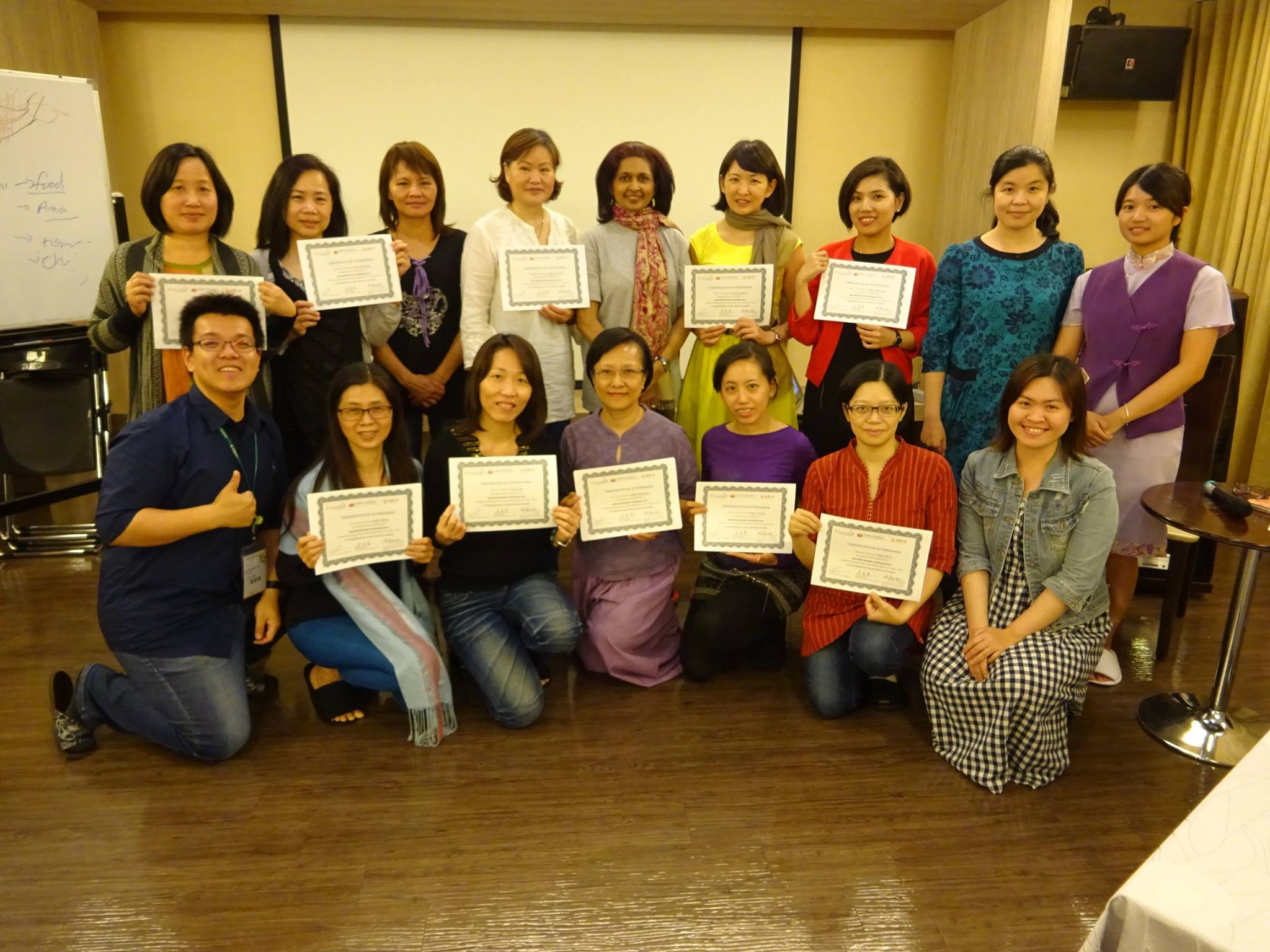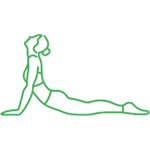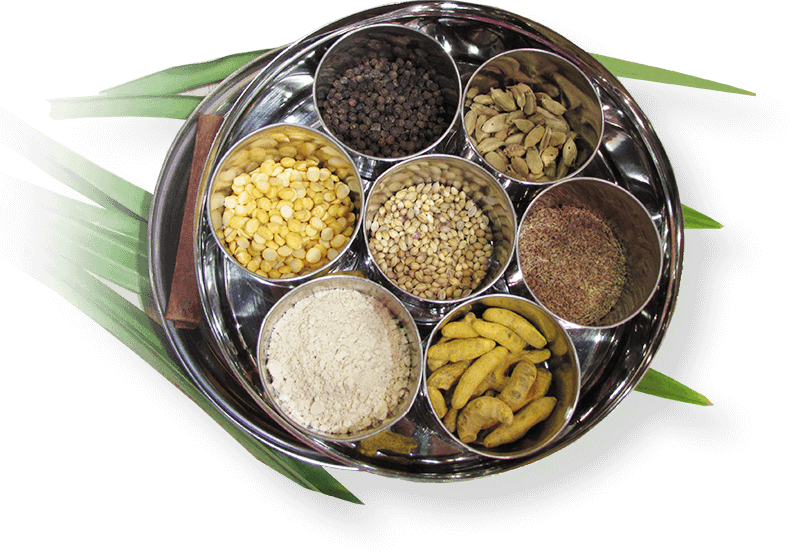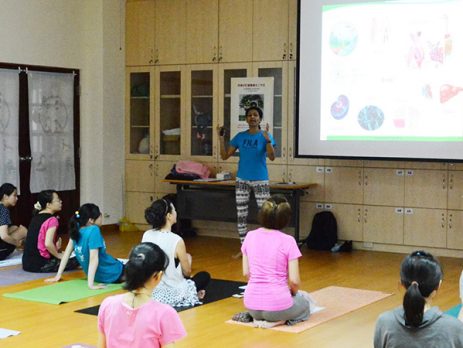Certification Program
- Home
- Certification Program
- AYTT (Ayurvedic Yoga Teacher Training)
Ayurvedic Yoga Teacher Training (AYTT)
According to Ayurveda and Yoga, taking care of your Mind is as good as taking care of your Life because both these sciences see an intimate and inseparable connection between the Mind and Body. Yoga is not about postures, exercise, stretching, therapy, breathing or physical health. All these are merely tools to help you achieve the Presence of Mind. In another words, your state of being in the Present moment Yoga and our current fast paced lifestyle prevents us from being in the Present Moment.
Patanjali Yoga Sutra also known as Raja Yoga, defines Yoga as “yogash chitta vritti nirodhah (PYS 1.2). It means Yoga is that which regulates the constant movement or thought patterns of the mind. Being aware or being conscious of your thoughts is Yoga. Modern science has coined a new word for this and calls it “Meta Cognition”. Even though the word Meta cognition is new, the principle was rooted in India thousands of years ago. Yoga is a State of Being and Pantanjali’s Yoga focuses on this.

The Ayurvedic Yoga Teacher Training (AYTT) Course systematically integrates the fundamental principles of yogic philosophy and Ayurvedic philosophy, the various aspects of Yoga-Asanas (postures), Pranayama (breath mastery), overview of Kriyas (cleansing techniques) and Trataka (eye concentration) into a holistic manner, thus enabling you to understand and impart the knowledge of Yoga and Ayurveda in its truest sense. You will also have an overview of Ayurveda in relation to Yoga and how Asana and Pranayama can impact the Tridosha (Vata, Pitta, Kapha). You will also learn Ayurvedic properties of specific spices and herbs and how they balance the doshas. AYTT Students will understand the Ayurveda concept of individualised body type (Vata, Pitta & Kapha) and tailor yoga classes based on the body types and specific ailments. Most importantly, students will learn to understand the workings of the mind and the Power of Thought as expounded by classical Yoga and Ayurveda.
At the practical level, you will learn the techniques of basic Yoga-asanas (postures), including the benefits & contra-indications of each posture and the appropriate teaching techniques for each asana. You will also learn the practical aspect of Pranayama, Kriya (Cleansing) and Trataka (eye focus). You will also learn a specific Ayurvedic nutritional dish for balancing the doshas.
Course Outline and Structure
Interrelationship between Yoga and Ayurveda
In this AYTT program, you will learn why diet and lifestyle are closely interrelated and why eating healthy food while being fearful is not going to nourish your body. You will learn how the postures affect the mind and vice versa. You will learn the concept of Vata, Pitta and Kapha and importance of knowing your body type for practicing Yoga asana.
Yogasana (Postures)
Yoga is misunderstood as asana. Asanas are yogic postures and they are mainly divided into 2 parts : physical and meditative. Physical postures aim at making your body supple and cleanses the nadis (Channels in the body. Ayurveda states that there are 72,000 nadis in our body and asana (done in the classical yoga way) helps remove these blockages. It is for this reason that many people feel the therapeutic benefits when doing asana. In this section you will also learn definition of classical yoga and the various types of yoga as well as the difference between Yoga and exercise. You will learn both the theoretical and the practical aspects of Asana. You will learn all the basic asanas that will balance your entire body system.
A set of 12 basic yogasana (postures) will be explored in depth, including their contra-indications and therapeutic, mental and emotional benefits of each posture. The basic set includes

Standing Postures

Sitting postures

Prone Postures

Supine Postures

Sun Salutation
You will also learn the benefits of each posture and how to apply each posture for different therapies eg back pain, diabetes, obesity etc
Pranayama (Yogic Breathing)
In Pranayama you will learn how to expand and utilise your inner energy – it is like charging the battery within you. Breathing itself is not pranayama because if you put a person in a ventilator the body breaths, but the person does not have Prana. Prana is the vital life force and in Pranayama you are learning to direct that vital life force. Pranayama is an important aspect in Yoga classes as it is the link between the mind and the body and helps you balance the mind. Ayurveda mentions 5 types of Prana (Prana, Apana, Udana, Samana and Vyana Vayu). You will study different types of Pranayama and the therapeutic benefits of each Pranayama. You will also discover why and how the downward moving prana cleanses the body while the upward moving prana nourishes the body. You will also learn how Pranayama balances or aggravates dosha and how to customise programs for your family and friends.
Role of Mind
Patanjali has given a detailed explanation on how the mind (antakarana) works. You will learn the four broad functions of the mind namely the Citta (memory bank), Buddhi (the power to differentiate), Ahankara (identity creator) and the smaller Mind (Manas) and how they work in a coherent manner to create balance or independently to create imbalance. You will also learn the qualities (Sattva, Rajas and Tamas) of the Mind and how they are corelated with Vata, Pitta and Kapha and how to bring out the best quality of the Mind. In relation to this, you will also learn the Science behind Brain Waves (Beta, Alpha, Delta and Theta) and how Yoga correlates the brain waves and how different Yogic practices can bring you to Alpha to Theta Brain wave.
Trataka (Eye Focusing)
Trataka is one the 6 Yogic Cleansing Technique (Kriya). Trataka is one way of practicing Pratyahara (sense withdrawal) and Dharana (Focussing). You will learn both narrow focussing and divergent or open focussing and the relationship between the Pineal gland and Trataka. You will also learn simple Trataka technique.
Fundamental Principles of Ayurveda
You will learn the fundamental principles of Ayurveda and how the Panchamahabutha (5 Great States) form the Tridosha called Vata, Pitta and Kapha. You will also learn to apply these principles for Asana and Pranayama. You will learn how to make a special Ayurvedic dish aimed at balancing the 3 doshas (Vata Pitta and Kapha).
Teaching Methodology
You will learn how to design classes in a systematic way to cater for short 30 minutes yoga class to 1 hour yoga class.
Course Hours
The AYTT Course is a 200-hour training programme will include
100 hours
of theory and practice (this will be conducted both on-site and online)
100 hours
of teaching practice where you will teaching and refining your teaching skills.
Class Assessments
This will be divided into practical and theory.

Practical
You will be assessed on how you teach asana and pranayama in the presence of your class.

Theory
This will include class discussion and assignment to ensure that you understand Yoga in its entirety

Writing
a report on any suitabl e yoga subject. You can discuss it with the teacher and choose a topic.
Certification Criteria
You will have to complete 100 hours of teaching yoga as well as all your assignments before you get your certificate. This can be completed within 5 months to 2 years, depending on your dedication, time and commitment. You can either be a lead trainer or an assistant to a lead trainer in any class. Certificate will be awarded after the completion of the teaching practice.
Awarding of certificates is based on following criteria.

- Attendance (90%).
- Completion of homework and assignments
- Practical test & theory exams.
- Class Assessment
- Teaching Practic
Certificate will be awarded only after students complete the 120 hours of teaching.
Certificate
Ayurveda Association of Singapore (AAOS)
AAOS was established in Singapore in 2009 and its aim is to spread the awareness of holistic nutrition and promote holistic wellness and wellbeing.
Ramaiah Indic Specialty Ayurveda (RISA) Restoration Hospital
(A unit of Gokula Education Foundation (Medical), Bangalore India headed by the world-renowned Prof GG Gangadharan. MS Ramaiah is one of the pioneer hospitals to integrate traditional medicine with modern system of science to promote wellness. Integrative Medicine (MSR ICAIM) (Bangalore, India)

Field Report
Writing a report on any suitable yoga subject. Students can discuss it with the teacher and choose a topic.
Certificate
Awarding of certificates is based on following criteria
- Attendance (90%).
- Completion of homework and assignments
- Practical test & theory exams.
- Assessment - feedback from
Certificate will be awarded only after students complete the 120 hours of teaching

Certificates
Ramaiah Indic Specialty Ayurveda (RISA) Restoration Hospital (A unit of Gokula Education Foundation (Medical), Bangalore India headed by the world-renowned Prof GG Gangadharan. MS Ramaia is one of the pioneer hospitals to integrate traditional medicine with modern system of science to promote wellness.
Ayurveda Association of Singapore (AAOS) was established in Singapore in 2009 and its aim is to spread the awareness of holistic nutrition and promote holistic wellness and wellbeing.



